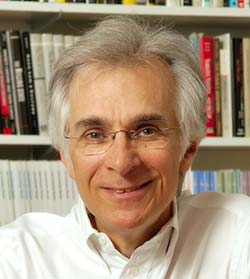It all started two years ago, when Professor Austin Sarat had the idea to meet regularly with his first-year students outside of the class schedule. Sarat, the William Nelson Cromwell Professor of Jurisprudence and Political Science, invited three staff members to join him, and together they provided a space for students in his popular first-year seminar, “Secrets and Lies,” to converse about topics that touched on the new students’ lives on campus. His goal: to extend the work typically done in New Student Orientation throughout the fall semester.
“I wanted them to talk about what was going well for them, what wasn’t. How they were balancing curricular and extracurricular minds, and how they were responding to stress,” Sarat says.

Austin Sarat, the William Nelson Cromwell Professor of Jurisprudence and Political Science
Sarat, who is also associate dean of the faculty, then set out to extend the idea to other first-year seminars. He consulted with the Dean of the Faculty Catherine Epstein and President Biddy Martin about expanding this program. Last year, 16 first-year seminar classes had teams of a professor and staff members facilitating discussions outside of class. Today, 18 first-year seminars are participating. Staff members have been eager to help out: more have signed up to participate than the number of spots available.
Sarat is firm in his belief that “students don’t care how much you know, until they know how much you care.” Facilitating important conversations among professors, staff members and students signals to students that the people who work on campus care about their well-being, he says.
Assistant Professor of Political Science Jonathan Obert, who teaches the first-year seminar “Violence and Politics,” is among those participating. “Part of negotiating complex ideas in the classroom is having a space to make sense of those ideas elsewhere,” he says. “Our conversations contribute to the sense that our classrooms are more than books, professors and papers, but rather are also embedded in a broader conversation.”
Political science and sociology major Sophia Salazar ’18, who was in Sarat’s first-year seminar course two years ago, attended a public high school with a student population larger than Amherst’s. “Talking about your personal experiences with deans and administrators was essentially uncharted territory for me,” she says. “But having the space to get to check in with faculty and students about the joys and challenges of adjusting to our first year in college was, in hindsight, very valuable, because it made the transition a little less intimidating.”
Sarat has found that a common worry among first-year students is that they do not belong; they often think they are the only ones who feel that way. The group discussions allow them to share emotions and thoughts that at times can feel overwhelming.
“Attending to the well-being of the students in this context has academic, as well as non-academic, benefits,” Sarat says. “We are not just educating minds, but persons with minds, and this is a way of attending to persons with minds.”
Salazar says the experience taught her to be in tune with her whole self, not just her intellectual self. “Understanding and thinking critically about the personal lens in which you view the world is critical to developing academically,” she says, “and having the space to talk about your personal experiences in a meaningful way reflects the essence of a liberal arts education.”
